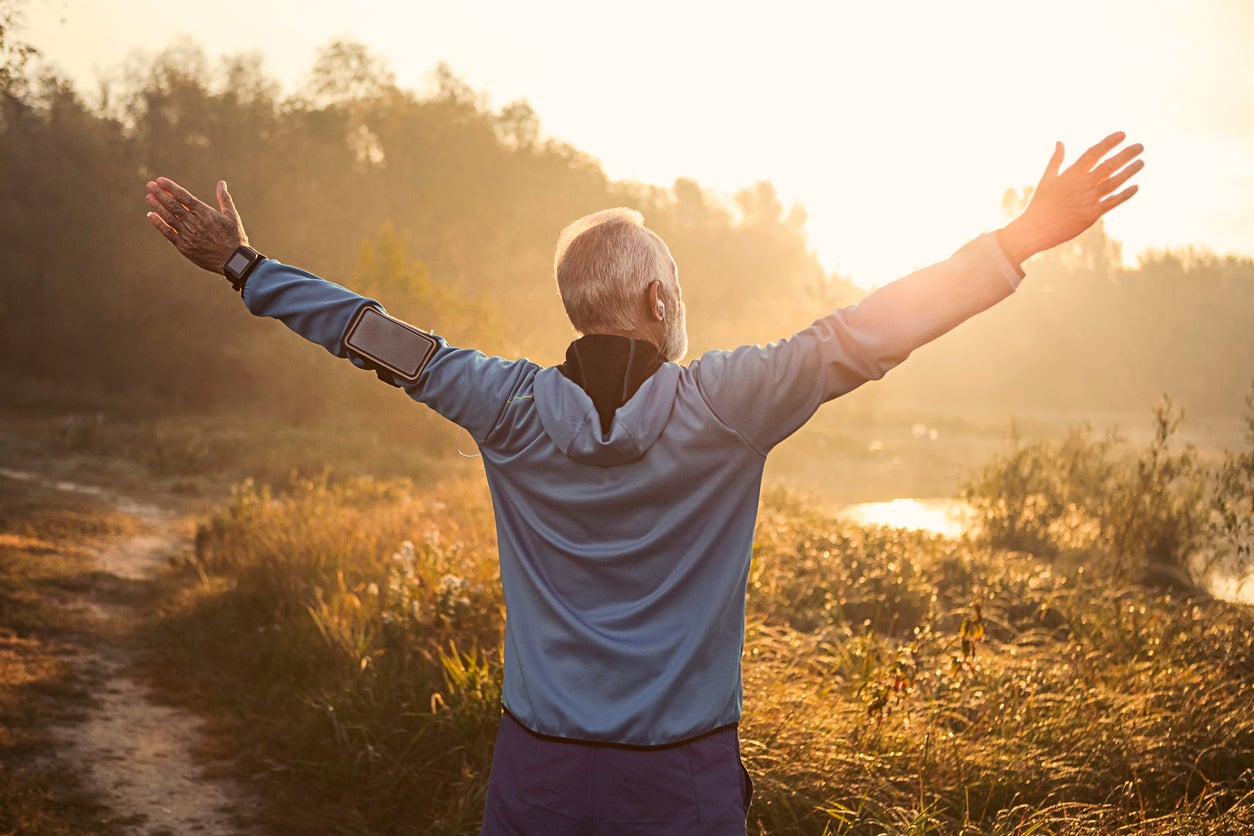My physical health has never been better – the pandemic has made me rethink my entire way of life
My curiosity and the need for movement and activity won’t just vanish, but lockdown has made me consider changing my lifestyle permanently


Your support helps us to tell the story
From reproductive rights to climate change to Big Tech, The Independent is on the ground when the story is developing. Whether it's investigating the financials of Elon Musk's pro-Trump PAC or producing our latest documentary, 'The A Word', which shines a light on the American women fighting for reproductive rights, we know how important it is to parse out the facts from the messaging.
At such a critical moment in US history, we need reporters on the ground. Your donation allows us to keep sending journalists to speak to both sides of the story.
The Independent is trusted by Americans across the entire political spectrum. And unlike many other quality news outlets, we choose not to lock Americans out of our reporting and analysis with paywalls. We believe quality journalism should be available to everyone, paid for by those who can afford it.
Your support makes all the difference.In saying what I am about to say, I minimise neither the seriousness of Covid-19, nor the death, grief, pain and panic this wretched virus has caused.
But something very strange has occurred since the pandemic came to dominate our lives: I have had the healthiest year of my adult life, bar none.
This accidental discovery is making me rethink not just my priorities, as Covid-19 has done for many, but my entire way of life.
I say “accidental”, in that it came from something Fiona Millar, my partner for the past 40-plus years, said after reading a draft of volume eight of my diaries, covering 2010-15. Fiona is on a very short list of people to whom I give the power of the red pen. Indeed, she is first in line, followed by our three children and a good libel lawyer. I waited patiently as she read through the 374,000 words.
Her main observation was as follows: “Have you noticed,” she said, “how you were always ill?”
“No, because I wasn’t,” I said.
“Yes, you were. You’re forever seeing doctors, in and out of hospitals, operations, medication, colds, chest infections; every other page there is something.”
“That’s rubbish,” I argued.
A very basic row; familiar, no doubt, in tone, if not in detail, to many of you. Once I had insisted that I was right and she was wrong, I left the room, went to my office, called the book up on the computer, and checked to see whether she might have a point. Mmm...
So first off, there is the depression thing, on which I wrote a whole book, Living Better, last year. Indeed, because of his sizeable index entry, my psychiatrist, David Sturgeon, has been added to the “Who’s Who” of key figures, while sports psychologist Andy McCann pops up regularly to help me deal with waves of anxiety, panic attacks and insomnia, offering me tactics I use to this day.
Read more:
These regular references to mental illness, up to and including suicidal thoughts at one end of the scale, and manic activity at the other end, therefore come as no surprise. What did come as a shock, however, when scanning through to prove Fiona wrong, was how right she was. Indeed, if “Alastair Campbell health” had its own index entry, it would be a long one indeed.
If close family members were added, it would challenge the length of the entries for Tony Blair, David Cameron and Ed Miliband, with my mother’s death after a stroke, my brother Donald’s schizophrenia, brother Graeme’s hospitalisation and double leg amputation, son Calum’s alcoholism, our daughter Grace’s anxiety and suffering a horrific broken leg, and our son Rory who was knocked off his bike by a lorry. Even the dog gets in on the act. These are the opening words of the entry that recorded the otherwise more significant event of Ed Miliband beating his brother David to become leader of the Labour Party: “Molly ill. Woke to blood all over the carpets downstairs.”
My first hospital visit comes as early as page seven, a trip to the Royal National Throat, Nose and Ear Hospital for an operation – I’ve had three – to deal with recurring polyps. On page 10, I am in the Royal Free Hospital. I am there to visit my son Rory, who is on a drip, an oxygen mask over his face, the sight of which makes me faint. I am kept in overnight for observation.
On page 14, I am called in by my GP for a review of my various medications. I am back in the Royal Free by page 87, November 2010, for my annual colonoscopy and biopsies to check on the ulcerative colitis I developed in volume one (1994-97). All good. However, a week later I am getting antibiotics for a chest infection, ahead of a trip to Scotland. Then to Jordan where “I was wheezing even more with all the smoking going on”.
I’d virtually forgotten – pain has no memory – another several-day spell in the Royal Free when I lost about a stone after picking up dysentery somewhere between the Balkans and central Asia. I had to visit A&E in Albania (jogging-induced broken ribs, one of several “sports injuries”), got treated by Team Sky’s doctor, no less, for a chest infection in Mallorca, and there was the excellent hospital in Singapore where I had a urinary infection that made it feel like I was pissing razor blades. There was the growth in my groin that required another hospital trip for ultrasound treatment. Then there was my new illness, GERD (gastroesophageal reflux disease), which was like an acid reflux thing and a bit of a nightmare, causing me to lose sleep.
There was my ongoing stomach problem, and my regular colonoscopy at the Royal Free to check my colitis was under control. Volume eight colonoscopy number one, all clear. Number two, something called “hypoplastic polyps” were detected, which meant another colonoscopy sooner than the regular annual one. As anyone who has ever had one knows, the preparation is not nice. It led to a rare one-liner in my diary: “A health day … MRI to check out spots on the liver am. Colonoscopy pm.”
Through the five years, I was on and off antidepressants, on and off antibiotics, on and off steroids. The numerous colds and chest infections do seem to coincide with periods when I am constantly on and off planes. Ear infections too, including one in France, where the doctor prescribed me a drug that, needless to say, I took without reading the instructions, only belatedly and in subsequent agony – “pain like I have never known” – to learn that “it should not be administered to asthmatics”.
What is especially weird about this litany of sickness is that I would consider myself to be among the very fittest of my age group. I exercise every day, and watch what I eat and drink. My resting pulse rate, usually about 48, has for years been well below my age, currently 63, as I kept telling the heart specialist who was worried about me enough to keep me in after my embarrassing fainting spell. And, honestly, I don’t think I am a hypochondriac.
Read more:
But weirder still – and might this be the main reason I was so defensive when Fiona first suggested I was “ill on virtually every other page”? – since Covid-19 forced a very different kind of lifestyle upon us, I have not had any physical illness at all. What’s more, the depression has been under greater control than usual. I had a couple of moderately severe depressive episodes in the first lockdown, a third less-severe one more recently, and also a short spell when I was at the other end of the scale, manic. For a whole year, that is a good tally, believe me. But on the physical health side of life ... nothing.
So, the moral of the story that this volume, my body – and Fiona – seem to be telling me is clear: slow down for God’s sake. Stop doing so much and stop travelling so much – especially on planes. Thanks to Covid-19, I have done that, and because I have been avoiding people rather than seeking them out, following the rules rather than following my instinct for activity and curiosity, staying home rather than travelling the globe, however busy I am stuck up here in the office at the top of the house, I am much, much less ill than I was pre-Covid, or in any year of my adult life.
I can barely remember the last time I sneezed, let alone caught a cold, or a chest infection. My asthma has been better. My stomach is fine. The polyps are at bay. The only time I went to the Royal Free during the pandemic was to get my vaccine. And the last contact I’ve had from my wonderful GP surgery was a call from them, as they were worried they had not heard from me for a while. I was last abroad just before the third lockdown, and I have not been on a plane for a year. Am I alone in having seen big changes in my professional life lead to a major decrease in my physical illnesses? I would love to know. But I hardly see anyone.
As to whether this will lead to me changing my lifestyle permanently, I just don’t know. Curiosity and the need for movement and activity cannot just vanish, can they? But I am certainly thinking about it, even at the cost of volume nine or 10 having more mundane entries than their forerunners:
2 March 2021: “Googled a few pieces about how low humidity on planes makes you likelier to get a cold. Read a Journal of Environmental Health Research paper that said ‘colds may be 113 times more likely to be transmitted on a plane than during normal daily life on the ground’. Then read an Alabama University paper that said germs from previous passengers stay on the surfaces in the plane for a week! So, on future flights, I might sneer and snort a bit less when someone plonks themselves down next to me and starts cleaning their seat, armrests, seatbelt etc. with antiseptic wipes. Cancelled a planned meeting to do a Zoom call instead. Asked the BBC if it was OK to do planned interview on Skype. Fine. Stayed in all day. Had dinner, watched telly, went to bed. Reading a great book on how everyday illnesses make you depressed and anxious, and unable to sleep. Slept like a baby.”
Volume eight of Alastair Campbell’s diaries, The Rise and Fall of the Olympic Spirit, is published on Thursday (Biteback £25). Living Better: How I Learned to Survive Depression is published in paperback on 29 April (John Murray, £10.99)
Join our commenting forum
Join thought-provoking conversations, follow other Independent readers and see their replies
Comments